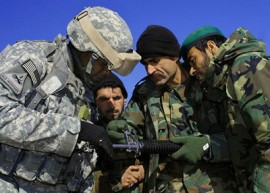
Numerous commentators have looked for historical parallels for the war in Afghanistan, the repeated attempts at occupation by the British during the 19th century and the Soviet invasion in 1979 being favourites. I think there is another, more recent, example that is also instructive, namely the peace settlement in Bosnia in 1995.
The Nato strategy was to back the government and use just enough force to bring the rebels to the negotiating table; rather than seeking to destroy them in battle completely. In Afghanistan, the strategy is drifting from one of seeking victory towards something on the Bosnia model. David Miliband, when foreign secretary, called for just such a policy and there are voices in the current government and elsewhere that agree. Above all, the Nato countries want to scale down their military commitment while building up the capacity of the Afghan armed forces in their own right.
I wonder whether this can work. The lessons of Bosnia are relevant here.
Specifically, let us imagine that the fighting prowess of the Nato force is enough to bring about talks with the Taliban. What then? In Bosnia, 50,000 troops were required to police the ceasefire and keep the peace, after the immediate fighting was over. It is estimated that each peacekeeper costs about $250,000 a year to deploy, so that peace in Bosnia cost $12.5 billion each year. Afghanistan has a population 7 times that of Bosnia, and a land area more than 12 times the size of Bosnia with much less forgiving terrain. An Afghan peace-keeping force on the same scale would need to be at least 300,000 troops, costing $75 billion a year. By contrast, total Afghan GDP is only $13 billion a year. Such an Afghan force is unaffordable.
So, either the Afghan government is unable to bring the country to order, even after a Nato military victory, or foreign troops are going to have to stay there a lot longer.
Of course, a strategy that aimed to destroy the Taliban completely would probably not need so many peace-keepers after the war was over, but it would require a great many more troops deployed for fighting right now. Is it likely that Obama and Cameron can commit to such a course of action? I really think not.
Perhaps the numbers I quote above are too large. Would there really to be as many as 300,000 soldiers deployed? At present, there are about 120,000 Nato soldiers alongside about 200,000 Afghans, and that is a force engaged in heavy fighting in some parts of the country. If that heavy fighting were at an end, perhaps fewer would be needed. (Under the Soviet occupation in the 1980s, incidentally, Soviet and loyal Afghan forces peaked at something over 300,000.)
Even if my suggested minimum number of soldiers needed is too big, and if they can be provided more cheaply than Nato in Bosnia, the cost will still be far too big. The model of an outside force bringing the war to an end and then withdrawing cannot work, unless that outside force is willing to take on a much bigger and longer commitment than it currently is prepared to do.
If that is the case, what is the alternative? There is a school of thought that treats the Afghan war as a civil war between different regional and tribal factions in which the Nato countries have little interest. The role of Afghanistan as an incubator for Islamist terrorism was ended several years ago, and it is the uncertainty provoked by war that encourages farmers to grow poppies for heroin rather than a socially more useful crop. A policy that encouraged peace rather than one that sought victory might be more valuable, a policy that would bring in neighbouring countries as guarantors rather than tried to prevent them from “interfering”.
But Nato countries would have to adapt to a world in which their military prowess does not bend and shape other countries’ policies and strategies, that is to say a world in which more powers have a voice that demands to be heard. If there is a lesson that the Afghan invasion has to teach, perhaps it is this.
